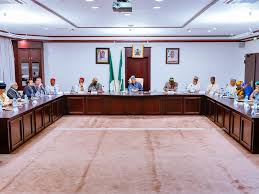The Nigerian Government and the International Cotton Advisory Committee (ICAC), have commenced moves towards the resuscitation of Nigeria’s moribund cotton industry.
The target is to create over 1.4 million jobs annually in the cotton/textile sector, while the focus is to develop key components of the cotton value chain comprising farming, weaving, ginning and linking of cotton in line with the industrialisation drive of the Nigerian government.
Nigeria’s Vice President Kashim Shettima said after meeting with a delegation from the ICAC led by its Executive Director, Mr. Eric Trachtenberg, at the State House, Abuja on Tuesday that the stakeholders would come up with a roadmap for the revitalisation of the cotton/textile sector in Nigeria and that, “it is time to work more and talk less”.
He assured that the Nigerian Government would make conscious efforts to ensure Nigeria harnesses opportunities in the cotton value chain, including ensuring that Nigeria regains its ICAC membership.
The Vice President thanked the delegation for the visit, just as he acknowledged ICAC’s commitment to the development of the sector in Africa, noting that, “your diverse backgrounds in ICAC gives a nuance understanding of the complexities and opportunities in the cotton value chain.”
Addressing newsmen after the meeting, stakeholders, including governors, industry players and international partners, saw the plans bringing in more jobs, other economic advantages and an improved security.
Earlier in his remarks, Trechtenberg said he was pleased with the level of interest and commitment shown by the leadership of the country and other stakeholders in reviving the industry in Nigeria.
Citing examples in China, India, Pakistan and other parts of the world, the ICAC Executive Director said the potentials in the cotton value chain was huge and has proven to be transformative.
He noted that cotton and textile offer competitive advantage, economic transformation and is a very competitive product that can be sold, both domestically and internationally, with probability to generate high quality jobs for now and in the future.
According to him, ICAC would support Nigeria’s cotton value chain revamp by offering expert advice in improving productivity and boosting the value chain and investment facilitation.
The Executive Director of the International Cotton Advisory Committee (ICAC), Trachtenberg, expressed excitement about the prospects of Nigeria’s cotton industry, citing a “compelling historical moment” for growth and development.
He noted that Nigeria has low-cost labor, market access to the African Growth and Opportunity Act (AGOA) and Economic Partnership Agreements with the EU, and a talented workforce.
Trachtenberg emphasised that ICAC was committed to supporting Nigeria achieve its goals, creating quality jobs, generating foreign exchange, and re-imagining the global cotton economy.
GIK/APA


